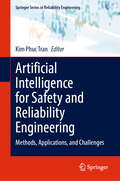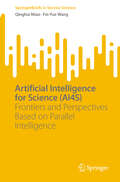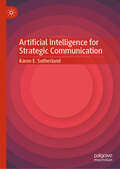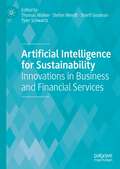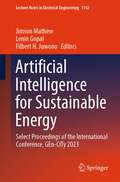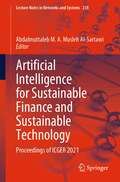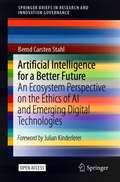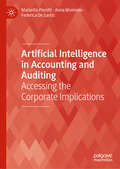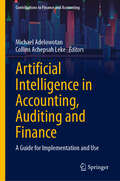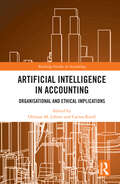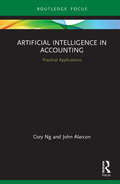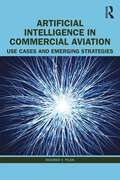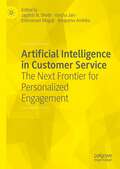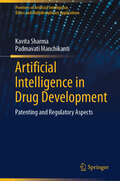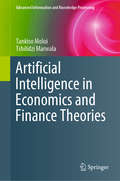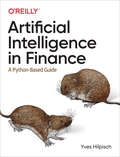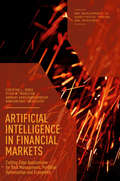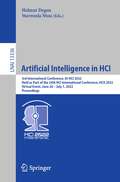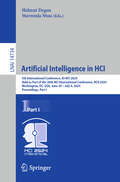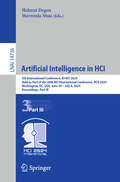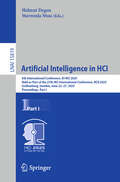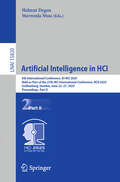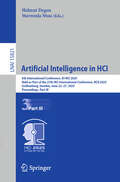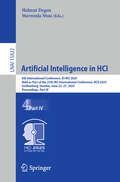- Table View
- List View
Artificial Intelligence for Safety and Reliability Engineering: Methods, Applications, and Challenges (Springer Series in Reliability Engineering)
by Kim Phuc TranThis book is a comprehensive exploration of the latest theoretical research, technological advancements, and real-world applications of artificial intelligence (AI) for safety and reliability engineering. Smart manufacturing relies on predictive maintenance (PdM) to ensure sustainable production systems, and the integration of AI has become increasingly prevalent in this field. This book serves as a valuable resource for researchers, practitioners, and decision-makers in manufacturing. By combining theoretical research, practical applications, and case studies, it equips readers with the necessary knowledge and tools to implement AI for safety and reliability engineering effectively in smart manufacturing contexts.
Artificial Intelligence for Science: Frontiers and Perspectives Based on Parallel Intelligence (SpringerBriefs in Service Science)
by Fei-Yue Wang Qinghai MiaoThis book presents a comprehensive framework for analyzing, evaluating, and guiding AI for Sciences (AI4Sci) research, offering a unified approach that facilitates analysis across various academic fields through a shared set of dimensions and indicators. It provides a systematic overview of recent AI4Sci advances in various disciplines and offers insights into the latest issues in and prospects of AI4Sci. The book is based on the theory of Parallel Intelligence (PI), which forms the foundation for the general AI4Sci framework. By analyzing multiple cases in various academic fields, this framework integrates key elements of AI4Sci, such as real scientific problems, datasets, virtual systems, AI methods, human roles, and organizational mechanisms, from a multidimensional perspective. It also assesses and summarizes the limitations of AI4Sci, incorporating the latest advances in AI for fundamental models. Lastly, it explores the impact of DeSci and DAO, as well as TAO, on AI4Sci ecosystem development and prospects. Through its balanced approach, the book offers readers a goal-oriented perspective, focusing on a concise presentation of the core ideas and reducing detailed descriptions of specific AI4Sci cases to a minimum.
Artificial Intelligence for Strategic Communication
by Karen E. SutherlandIn an era where AI is revolutionising every aspect of communication, this groundbreaking research monograph provides an essential roadmap for navigating the intersection of artificial intelligence and strategic communication. Drawing on extensive primary research, including interviews with 41 experts and surveys of 400 professionals across three continents and eight countries, this book provides insights from relevant scholars, communication practitioners and AI tool developers. This comprehensive guide combines scholarly rigour with practical application, presenting a data-informed Model for Practice that helps to withstand the constant evolution of AI technology. Each chapter delivers research-informed, actionable tools relating to the multifaceted field of strategic communication including ethical practice, strategy development, content creation, evaluation, and continuous improvement. Bridging the gap between theoretical understanding and practical implementation, AI for Strategic Communication is an invaluable resource for strategic communication scholars, students, and practitioners, essential for advancing careers in the age of AI. This work emerged from the need for a comprehensive source combining scholarly, practitioner and AI developer perspectives on strategic communication from around the globe.
Artificial Intelligence for Sustainability: Innovations in Business and Financial Services
by Thomas Walker Sherif Goubran Stefan Wendt Tyler SchwartzIn light of the climate crisis, businesses are expected to embrace sustainability to reduce their negative impacts on the environment and society, while at the same time strengthening their organisations’ positive impacts. Managing this alongside the traditional requirements of business requires careful handling, and it is small wonder that some are heralding the advantages posed by artificial intelligence (AI) as the missing piece of the puzzle. This edited book aims to present a balanced discussion of the benefits and costs of using AI for the natural environment and society, including an analysis of its potential to help meet the UN’s Agenda 2030 and the Sustainable Development Goals. Researchers, practitioners, regulators, and entrepreneurs at the forefront of sustainable AI solutions share insights into the different sustainable applications of AI and highlight how these new developments may affect and contribute to our fight against climate change and address further environmental and social challenges. This volume will be of great interest to scholars and students of digital business and new technologies, sustainability, and strategy.
Artificial Intelligence for Sustainable Energy: Select Proceedings of the International Conference, GEn-CITy 2023 (Lecture Notes in Electrical Engineering #1142)
by Jimson Mathew Lenin Gopal Filbert H. JuwonoThis book presents select proceedings of the International Conference on Green Energy, Computing, and Intelligent Technology (GEn-CITy 2023) held at the University of Southampton Malaysia in July 2023. This book primarily covers clean energy and intelligent technologies for a sustainable future. This book serves as a forum for engineers, researchers, and specialists from academia, research centers, and industry worldwide to discuss and present the latest developments and applications related to the challenges of securing green and clean energy sources for the 21st century to protect the environment.
Artificial Intelligence for Sustainable Finance and Sustainable Technology: Proceedings of ICGER 2021 (Lecture Notes in Networks and Systems #423)
by Abdalmuttaleb M. A. Musleh Al-SartawiThis book shows latest research on artificial intelligence for sustainable technology. ICGER 2021 was organized by the Accounting, Finance and Banking Department at Ahlia University, Bahrain, and was conducted on the 15th and 16th of September. The strategic partners included the University of Jordan, the Bahrain Economists Society, the Association of Chartered Certified Accountants: ACCA, Al-Barka Banking Group and the International Computer Auditing Education Association: ICAEA . The theme of the ICGER 2021 centered around artificial intelligence for sustainable finance and sustainable technology. Accordingly, the papers presented at the conference provided a holistic view of sustainable finance, sustainability, AI, financial technology, cybersecurity, blockchain, CSR, and governance. This book, unlike ever before, brings together intelligence applications of new technologies and the sustainability requirements in the era of the digital economy, with special attention given to the opportunities, challenges, for education, business growth, and economic progression of nations which will help societies (economists, financial managers, engineers, ICT specialists, digital managers, data managers, policymakers, regulators, researchers, academics, and students) to better understand, use, and control AI applications and financial technologies to develop future strategies and to achieve sustainable development goals.
Artificial Intelligence for a Better Future: An Ecosystem Perspective on the Ethics of AI and Emerging Digital Technologies (SpringerBriefs in Research and Innovation Governance)
by Bernd Carsten StahlThis open access book proposes a novel approach to Artificial Intelligence (AI) ethics. AI offers many advantages: better and faster medical diagnoses, improved business processes and efficiency, and the automation of boring work. But undesirable and ethically problematic consequences are possible too: biases and discrimination, breaches of privacy and security, and societal distortions such as unemployment, economic exploitation and weakened democratic processes. There is even a prospect, ultimately, of super-intelligent machines replacing humans. The key question, then, is: how can we benefit from AI while addressing its ethical problems?This book presents an innovative answer to the question by presenting a different perspective on AI and its ethical consequences. Instead of looking at individual AI techniques, applications or ethical issues, we can understand AI as a system of ecosystems, consisting of numerous interdependent technologies, applications and stakeholders. Developing this idea, the book explores how AI ecosystems can be shaped to foster human flourishing. Drawing on rich empirical insights and detailed conceptual analysis, it suggests practical measures to ensure that AI is used to make the world a better place.
Artificial Intelligence in Accounting and Auditing: Accessing the Corporate Implications
by Anna Monreale Mariarita Pierotti Federica De SantisThis book investigates the phenomenon of artificial intelligence (AI) in the accounting world. It integrates accounting competencies with specific competencies in AI and other digital technologies and offers an interdisciplinary perspective. First, the authors review and discuss the literature to summarize and systematize extant research on digitalization in accounting. Second, case studies are included to illustrate the potential impact of AI in business contexts in terms of opportunities and challenges. Based on these, the book explores how digitalization is influencing the accounting practice and what the most important avenues are for future research on digitalization in accounting, and will be of interest to researchers, students, and practitioners of financial technology, accounting, and risk management.
Artificial Intelligence in Accounting, Auditing and Finance: A Guide for Implementation and Use (Contributions to Finance and Accounting)
by Collins Achepsah Leke Michael AdelowotanThis book focuses on the use of Artificial Intelligence (AI) for accounting, auditing, and finance. It explores how AI can be leveraged to perform various tasks within these fields and offers real life examples to illustrate its features and facilitate implementation. The book further examines how different AI technologies, such as Machine Learning, Deep Learning, Natural Language Processing, and others, can be used to improve processes and functions in accounting and financial reporting. Furthermore, the authors explain the different subsets of Artificial Intelligence and how they can be used for practical purposes. The book provides a basic guide of these emerging technologies to help practitioners in the field to better understand how they can be implemented in their companies.
Artificial Intelligence in Accounting: Organisational and Ethical Implications (Routledge Studies in Accounting)
by Othmar M. Lehner Carina KnollArtificial intelligence (AI) and Big Data based applications in accounting and auditing have become pervasive in recent years. However, research on the societal implications of the widespread and partly unregulated use of AI and Big Data in several industries remains scarce despite salient and competing utopian and dystopian narratives. This book focuses on the transformation of accounting and auditing based on AI and Big Data. It not only provides a thorough and critical overview of the status-quo and the reports surrounding these technologies, but it also presents a future outlook on the ethical and normative implications concerning opportunities, risks, and limits. The book discusses topics such as future, human-machine collaboration, cybernetic approaches to decision-making, and ethical guidelines for good corporate governance of AI-based algorithms and Big Data in accounting and auditing. It clarifies the issues surrounding the digital transformation in this arena, delineates its boundaries, and highlights the essential issues and debates within and concerning this rapidly developing field. The authors develop a range of analytic approaches to the subject, both appreciative and sceptical, and synthesise new theoretical constructs that make better sense of human-machine collaborations in accounting and auditing. This book offers academics a variety of new research and theory building on digital accounting and auditing from and for accounting and auditing scholars, economists, organisations, and management academics and political and philosophical thinkers. Also, as a landmark work in a new area of current policy interest, it will engage regulators and policy makers, reflective practitioners, and media commentators through its authoritative contributions, editorial framing and discussion, and sector studies and cases.
Artificial Intelligence in Accounting: Practical Applications (ISSN)
by Cory Ng John AlarconArtificial Intelligence in Accounting: Practical Applications was written with a simple goal: to provide accountants with a foundational understanding of AI and its many business and accounting applications. It is meant to serve as a guide for identifying opportunities to implement AI initiatives to increase productivity and profitability. This book will help you answer questions about what AI is and how it is used in the accounting profession today. Offering practical guidance that you can leverage for your organization, this book provides an overview of essential AI concepts and technologies that accountants should know, such as machine learning, deep learning, and natural language processing. It also describes accounting-specific applications of robotic process automation and text mining. Illustrated with case studies and interviews with representatives from global professional services firms, this concise volume makes a significant contribution to examining the intersection of AI and the accounting profession. This innovative book also explores the challenges and ethical considerations of AI. It will be of great interest to accounting practitioners, researchers, educators, and students.
Artificial Intelligence in Accounting: Practical Applications (Routledge Focus on Business and Management)
by Cory Ng John AlarconArtificial Intelligence in Accounting: Practical Applications was written with a simple goal: to provide accountants with a foundational understanding of AI and its many business and accounting applications. It is meant to serve as a guide for identifying opportunities to implement AI initiatives to increase productivity and profitability. This book will help you answer questions about what AI is and how it is used in the accounting profession today. Offering practical guidance that you can leverage for your organization, this book provides an overview of essential AI concepts and technologies that accountants should know, such as machine learning, deep learning, and natural language processing. It also describes accounting-specific applications of robotic process automation and text mining. Illustrated with case studies and interviews with representatives from global professional services firms, this concise volume makes a significant contribution to examining the intersection of AI and the accounting profession. This innovative book also explores the challenges and ethical considerations of AI. It will be of great interest to accounting practitioners, researchers, educators, and students.
Artificial Intelligence in Commercial Aviation: Use Cases and Emerging Strategies
by Ricardo V. PilonThis book is a must read for aviation managers and all stakeholders that are interested in improving the business performance of airlines. In this book, the first of its kind on AI in Commercial Aviation, the author outlines how Machine Learning and AI are accelerating and improving the performance of airlines. Moreover, the author shares insights into many new use cases that emerging technology can deliver. He tackles all crucial functions from air navigation, flight operations, to sales, distribution, cargo, retailing, and commercial optimization. He then looks forward to blockchain and the metaverse and its opportunities. With connected devices and the Internet of Everything (IoE), airlines can become retailers, sell, deliver, and service holistic experiences tailored to individuals in real time. This requires airlines to modernize processes and practices supported by decision intelligence (AI) that ingests sophisticated insights and executes service automation in real time. Transforming airlines from a production to a services-based execution also requires departments to be aligned along overriding customer experience and profitability goals. The book demonstrates how AI can be deployed to redesign airline organization as well. The author also describes the next wave of business transformation around the integration of commercial functions using Composite AI at enterprise level. With his holistic understanding and experience in the airline industry, the author provides valuable insights and helps managers understand how to embrace ML and AI and contribute to future commercial aviation and cargo success.
Artificial Intelligence in Customer Service: The Next Frontier for Personalized Engagement
by Jagdish N. Sheth Emmanuel Mogaji Varsha Jain Anupama AmbikaThis edited volume elucidates how artificial intelligence (AI) can enable customer service to achieve higher customer engagement, superior user experiences, and increased well-being among customers and employees.As customer expectations dictate 24/7 availability from service departments and market pressures call for lower costs with higher efficiency, businesses have accepted that AI is vital in maintaining customer satisfaction. Yet, firms face tough challenges in choosing the right tool, optimizing integration, and striking the appropriate balance between AI systems and human efforts. In this context, chapters in this book capture the latest advancements in AI-enabled customer service through real-world examples. This volume offers a global perspective on this contemporary issue, covering topics such as the use of AI in enhancing customer well-being, data and technology integration, and customer engagement.
Artificial Intelligence in Drug Development: Patenting and Regulatory Aspects (Frontiers of Artificial Intelligence, Ethics and Multidisciplinary Applications)
by Kavita Sharma Padmavati ManchikantiThis book discusses how Artificial Intelligence developments have revolutionized the area of medicine and how companies use them to develop applications. While the book covers the growth of AI in medicine and the early developments in AI based medical tools, it provides an in-depth analysis of the current developments in relation to the area of medical diagnostics. The book focuses on how enterprises and institutes have developed their intellectual property portfolio, particularly patents, in this area. Cross-country patenting analysis helps in understanding key areas of growth in certain markets and also company strategies and arrangements. The introduction of AI based products in market is subject to regulation. The developments in policy and regulation influence the development and deployment of such products into the market. This book brings focus to the development of policy and regulation and how regulatory developments impact the introduction of AI-based healthcare products from a cross-country perspective. Further, how regulatory developments lead to the evolution of standards, build reliability and safety in this area are also examined. The unique aspect of this book is the comprehensive coverage of the dual aspects of the nature and scope of AI-based innovations in health care and the related drug regulatory aspects which are imperative for the understanding for students, researchers, and those who work in this area.
Artificial Intelligence in Economics and Finance Theories (Advanced Information and Knowledge Processing)
by Tshilidzi Marwala Tankiso MoloiAs Artificial Intelligence (AI) seizes all aspects of human life, there is a fundamental shift in the way in which humans are thinking of and doing things. Ordinarily, humans have relied on economics and finance theories to make sense of, and predict concepts such as comparative advantage, long run economic growth, lack or distortion of information and failures, role of labour as a factor of production and the decision making process for the purpose of allocating resources among other theories. Of interest though is that literature has not attempted to utilize these advances in technology in order to modernize economic and finance theories that are fundamental in the decision making process for the purpose of allocating scarce resources among other things. With the simulated intelligence in machines, which allows machines to act like humans and to some extent even anticipate events better than humans, thanks to their ability to handle massive data sets, this book will use artificial intelligence to explain what these economic and finance theories mean in the context of the agent wanting to make a decision. The main feature of finance and economic theories is that they try to eliminate the effects of uncertainties by attempting to bring the future to the present. The fundamentals of this statement is deeply rooted in risk and risk management. In behavioural sciences, economics as a discipline has always provided a well-established foundation for understanding uncertainties and what this means for decision making. Finance and economics have done this through different models which attempt to predict the future. On its part, risk management attempts to hedge or mitigate these uncertainties in order for “the planner” to reach the favourable outcome. This book focuses on how AI is to redefine certain important economic and financial theories that are specifically used for the purpose of eliminating uncertainties so as to allow agents to make informed decisions. In effect, certain aspects of finance and economic theories cannot be understood in their entirety without the incorporation of AI.
Artificial Intelligence in Finance: A Python-based Guide
by Yves HilpischThe widespread adoption of AI and machine learning is revolutionizing many industries today. Once these technologies are combined with the programmatic availability of historical and real-time financial data, the financial industry will also change fundamentally. With this practical book, you'll learn how to use AI and machine learning to discover statistical inefficiencies in financial markets and exploit them through algorithmic trading.Author Yves Hilpisch shows practitioners, students, and academics in both finance and data science practical ways to apply machine learning and deep learning algorithms to finance. Thanks to lots of self-contained Python examples, you'll be able to replicate all results and figures presented in the book.In five parts, this guide helps you:Learn central notions and algorithms from AI, including recent breakthroughs on the way to artificial general intelligence (AGI) and superintelligence (SI)Understand why data-driven finance, AI, and machine learning will have a lasting impact on financial theory and practiceApply neural networks and reinforcement learning to discover statistical inefficiencies in financial marketsIdentify and exploit economic inefficiencies through backtesting and algorithmic trading--the automated execution of trading strategiesUnderstand how AI will influence the competitive dynamics in the financial industry and what the potential emergence of a financial singularity might bring about
Artificial Intelligence in Financial Markets: Cutting Edge Applications for Risk Management, Portfolio Optimization and Economics (New Developments in Quantitative Trading and Investment)
by Christian L. Dunis, Peter W. Middleton, Andreas Karathanasopolous and Konstantinos TheofilatosAs technology advancement has increased, so to have computational applications for forecasting, modelling and trading financial markets and information, and practitioners are finding ever more complex solutions to financial challenges. Neural networking is a highly effective, trainable algorithmic approach which emulates certain aspects of human brain functions, and is used extensively in financial forecasting allowing for quick investment decision making. This book presents the most cutting-edge artificial intelligence (AI)/neural networking applications for markets, assets and other areas of finance. Split into four sections, the book first explores time series analysis for forecasting and trading across a range of assets, including derivatives, exchange traded funds, debt and equity instruments. This section will focus on pattern recognition, market timing models, forecasting and trading of financial time series. Section II provides insights into macro and microeconomics and how AI techniques could be used to better understand and predict economic variables. Section III focuses on corporate finance and credit analysis providing an insight into corporate structures and credit, and establishing a relationship between financial statement analysis and the influence of various financial scenarios. Section IV focuses on portfolio management, exploring applications for portfolio theory, asset allocation and optimization. This book also provides some of the latest research in the field of artificial intelligence and finance, and provides in-depth analysis and highly applicable tools and techniques for practitioners and researchers in this field.
Artificial Intelligence in HCI: 3rd International Conference, AI-HCI 2022, Held as Part of the 24th HCI International Conference, HCII 2022, Virtual Event, June 26 – July 1, 2022, Proceedings (Lecture Notes in Computer Science #13336)
by Helmut Degen Stavroula NtoaThis book constitutes the refereed proceedings of the Third International Conference on Artificial Intelligence in HCI, AI-HCI 2022, which was held as part of HCI International 2022 and took place virtually during June 26 – July 1, 2022. A total of 1271 papers and 275 posters included in the 39 HCII 2022 proceedings volumes. AI-HCI 2022 includes a total of 39 papers; they are grouped thematically as follows: Human-Centered AI; Explainable and Trustworthy AI; UX Design and Evaluation of AI-Enabled Systems; AI Applications in HCI.
Artificial Intelligence in HCI: 5th International Conference, AI-HCI 2024, Held as Part of the 26th HCI International Conference, HCII 2024, Washington, DC, USA, June 29 – July 4, 2024, Proceedings, Part I (Lecture Notes in Computer Science #14734)
by Helmut Degen Stavroula NtoaThe three-volume book set LNAI 14734, 14735, and 14736 constitutes the refereed proceedings of 5th International Conference on Artificial Intelligence in HCI, AI-HCI 2024, held as part of the 26th International Conference, HCI International 2024, which took place in Washington, DC, USA, during June 29-July 4, 2024. The total of 1271 papers and 309 posters included in the HCII 2024 proceedings was carefully reviewed and selected from 5108 submissions. The AI-HCI 2024 proceedings were organized in the following topical sections: Part I: Human-centered artificial intelligence; explainability and transparency; AI systems and frameworks in HCI; Part II: Ethical considerations and trust in AI; enhancing user experience through AI-driven technologies; AI in industry and operations; Part III: Large language models for enhanced interaction; advancing human-robot interaction through AI; AI applications for social impact and human wellbeing.
Artificial Intelligence in HCI: 5th International Conference, AI-HCI 2024, Held as Part of the 26th HCI International Conference, HCII 2024, Washington, DC, USA, June 29–July 4, 2024, Proceedings, Part III (Lecture Notes in Computer Science #14736)
by Helmut Degen Stavroula NtoaThe three-volume book set LNAI 14734, 14735, and 14736 constitutes the refereed proceedings of 5th International Conference on Artificial Intelligence in HCI, AI-HCI 2024, held as part of the 26th International Conference, HCI International 2024, which took place in Washington, DC, USA, during June 29-July 4, 2024. The total of 1271 papers and 309 posters included in the HCII 2024 proceedings was carefully reviewed and selected from 5108 submissions. The AI-HCI 2024 proceedings were organized in the following topical sections: Part I: Human-centered artificial intelligence; explainability and transparency; AI systems and frameworks in HCI; Part II: Ethical considerations and trust in AI; enhancing user experience through AI-driven technologies; AI in industry and operations; Part III: Large language models for enhanced interaction; advancing human-robot interaction through AI; AI applications for social impact and human wellbeing.
Artificial Intelligence in HCI: 6th International Conference, AI-HCI 2025, Held as Part of the 27th HCI International Conference, HCII 2025, Gothenburg, Sweden, June 22–27, 2025, Proceedings, Part I (Lecture Notes in Computer Science #15819)
by Helmut Degen Stavroula NtoaThe four-volume set LNAI 15819–15822 constitutes the thoroughly refereed proceedings of the 6th International Conference on Artificial Intelligence in HCI, AI-HCI 2025, held as part of the 27th International Conference, HCI International 2025, which took place in Gothenburg, Sweden, June 22-17, 2025. The total of 1430 papers and 355 posters included in the HCII 2025 proceedings was carefully reviewed and selected from 7972 submissions. The papers have been organized in topical sections as follows: Part I: Trust and Explainability in Human-AI Interaction; User Perceptions, Acceptance, and Engagement with AI; UX and Socio-Technical Considerations in AI Part II: Bias Mitigation and Ethics in AI Systems; Human-AI Collaboration and Teaming; Chatbots and AI-Driven Conversational Agents; AI in Language Processing and Communication. Part III: Generative AI in HCI; Human-LLM Interactions and UX Considerations; Everyday AI: Enhancing Culture, Well-Being, and Urban Living. Part IV: AI-Driven Creativity: Applications and Challenges; AI in Industry, Automation, and Robotics; Human-Centered AI and Machine Learning Technologies.
Artificial Intelligence in HCI: 6th International Conference, AI-HCI 2025, Held as Part of the 27th HCI International Conference, HCII 2025, Gothenburg, Sweden, June 22–27, 2025, Proceedings, Part II (Lecture Notes in Computer Science #15820)
by Helmut Degen Stavroula NtoaThe four-volume set LNAI 15819–15822 constitutes the thoroughly refereed proceedings of the 6th International Conference on Artificial Intelligence in HCI, AI-HCI 2025, held as part of the 27th International Conference, HCI International 2025, which took place in Gothenburg, Sweden, June 22-17, 2025. The total of 1430 papers and 355 posters included in the HCII 2025 proceedings was carefully reviewed and selected from 7972 submissions. The papers have been organized in topical sections as follows: Part I: Trust and Explainability in Human-AI Interaction; User Perceptions, Acceptance, and Engagement with AI; UX and Socio-Technical Considerations in AI Part II: Bias Mitigation and Ethics in AI Systems; Human-AI Collaboration and Teaming; Chatbots and AI-Driven Conversational Agents; AI in Language Processing and Communication. Part III: Generative AI in HCI; Human-LLM Interactions and UX Considerations; Everyday AI: Enhancing Culture, Well-Being, and Urban Living. Part IV: AI-Driven Creativity: Applications and Challenges; AI in Industry, Automation, and Robotics; Human-Centered AI and Machine Learning Technologies.
Artificial Intelligence in HCI: 6th International Conference, AI-HCI 2025, Held as Part of the 27th HCI International Conference, HCII 2025, Gothenburg, Sweden, June 22–27, 2025, Proceedings, Part III (Lecture Notes in Computer Science #15821)
by Helmut Degen Stavroula NtoaThe four-volume set LNAI 15819–15822 constitutes the thoroughly refereed proceedings of the 6th International Conference on Artificial Intelligence in HCI, AI-HCI 2025, held as part of the 27th International Conference, HCI International 2025, which took place in Gothenburg, Sweden, June 22-17, 2025. The total of 1430 papers and 355 posters included in the HCII 2025 proceedings was carefully reviewed and selected from 7972 submissions. The papers have been organized in topical sections as follows: Part I: Trust and Explainability in Human-AI Interaction; User Perceptions, Acceptance, and Engagement with AI; UX and Socio-Technical Considerations in AI Part II: Bias Mitigation and Ethics in AI Systems; Human-AI Collaboration and Teaming; Chatbots and AI-Driven Conversational Agents; AI in Language Processing and Communication. Part III: Generative AI in HCI; Human-LLM Interactions and UX Considerations; Everyday AI: Enhancing Culture, Well-Being, and Urban Living. Part IV: AI-Driven Creativity: Applications and Challenges; AI in Industry, Automation, and Robotics; Human-Centered AI and Machine Learning Technologies.
Artificial Intelligence in HCI: 6th International Conference, AI-HCI 2025, Held as Part of the 27th HCI International Conference, HCII 2025, Gothenburg, Sweden, June 22–27, 2025, Proceedings, Part IV (Lecture Notes in Computer Science #15822)
by Helmut Degen Stavroula NtoaThe four-volume set LNAI 15819–15822 constitutes the thoroughly refereed proceedings of the 6th International Conference on Artificial Intelligence in HCI, AI-HCI 2025, held as part of the 27th International Conference, HCI International 2025, which took place in Gothenburg, Sweden, June 22-17, 2025. The total of 1430 papers and 355 posters included in the HCII 2025 proceedings was carefully reviewed and selected from 7972 submissions. The papers have been organized in topical sections as follows: Part I: Trust and Explainability in Human-AI Interaction; User Perceptions, Acceptance, and Engagement with AI; UX and Socio-Technical Considerations in AI Part II: Bias Mitigation and Ethics in AI Systems; Human-AI Collaboration and Teaming; Chatbots and AI-Driven Conversational Agents; AI in Language Processing and Communication. Part III: Generative AI in HCI; Human-LLM Interactions and UX Considerations; Everyday AI: Enhancing Culture, Well-Being, and Urban Living. Part IV: AI-Driven Creativity: Applications and Challenges; AI in Industry, Automation, and Robotics; Human-Centered AI and Machine Learning Technologies.
